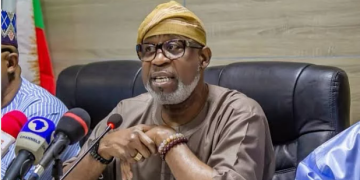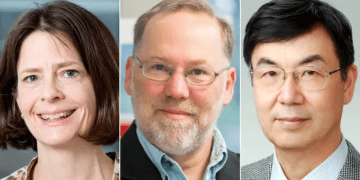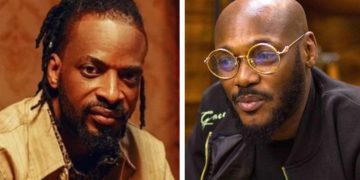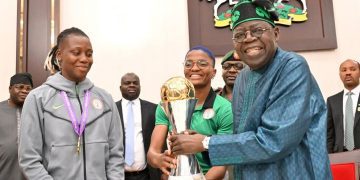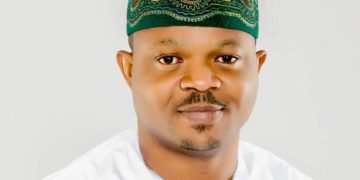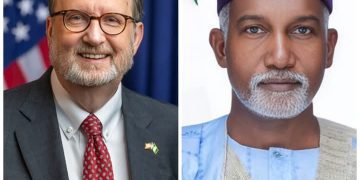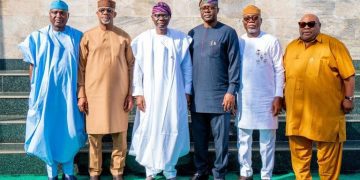The crowd in ABUAD listened, spellbound, as Olanipekun’s tribute grew more lyrical. He turned preacher, philosopher, and poet all in one breath. He described Afe Babalola as “a prolific writer, towering intellect, visionary architect, philosopher-king, renaissance sage, civic sentinel, legal luminary, potentate extraordinaire, national treasure and living legend
By Mike Awoyinfa
There are speeches—and there are moments when words turn into music, into poetry, into psalms of gratitude, admiration, and love. That was what happened at the 2025 Convocation Lecture of Afe Babalola University, Ado-Ekiti (ABUAD), when Chief Wole Olanipekun, SAN, mounted the podium. It was not a lecture in the cold, academic sense of the word. It was a son speaking to his father, a mentee addressing his mentor, a disciple paying homage to his master. It was a soul-stirring performance that turned the convocation arena into a cathedral of emotions. In his own words, it was: “Sir, your boy is talking to you.”
Chief Olanipekun, the learned silk and former President of the Nigerian Bar Association, stood before the great man he had admired since his teenage years and poured out his heart. He was not ashamed to be sentimental. He was not afraid to show reverence. He spoke like a psalmist praising his king. His voice quivered with nostalgia as he recalled his earliest memories of hearing about Afe Babalola—the lawyer who returned from Britain in grand style with a Mercedes Benz and instantly became a legend in Ekiti.
“Sir,” he said, “I knew you before I met you. At Amoye Grammar School in 1966, it was compulsory for us to read newspapers every day. I kept reading about this great lawyer called Afe Babalola who defended Chief J.O. Osuntokun after the military takeover. From then, I made up my mind: I wanted to be like you.”
That youthful admiration turned into destiny when, after completing his National Youth Service in 1978, the young Olanipekun finally saw his idol in the flesh at the Ilorin High Court. He waited patiently outside, burning with curiosity. When the court session ended, he summoned courage and approached him.
“My name is Wole Olanipekun,” he said shyly.
“Ah,” replied Afe Babalola. “Are you that Students’ Union leader from the University of Lagos?”
It was a moment of revelation. The great man already knew him! “You were reading about us, following our footsteps,” Olanipekun recalled. “I was blushing. You didn’t know.”
That chance encounter marked the beginning of a lifelong relationship between master and disciple. In that same meeting, Afe Babalola handed a legal file to the young lawyer and said, “Go and read this file. Make a note. Advise me. Bring it to Ibadan.”
The rest, as they say, is history. “You commended me,” Olanipekun recalled with emotion. “You gave me something. Your generosity is legendary. It didn’t start today.”
From that day, their bond grew deeper. To this day, Chief Olanipekun says, “Any lawyer who faces Afe Babalola in court is in trouble.” He called his mentor “a national pride and a national treasure,” recalling how, as a young barrister, he looked up to the pantheon of legal giants—F.R.A. Williams, Richard Akinjide, G.O.K. Ajayi, Kehinde Sofola, J.B. Majiyagbe, Gani Fawehinmi, and, of course, Afe Babalola. “Even though I took the silk before Gani Fawehinmi,” he confessed, “he was still my senior.”
And then came the moral lesson to the younger generation:
“Please, gentlemen, respect your elders if you want to be like them. You don’t pull an elder down. Whatever their mistakes, they deserve our respect and our courtesies.”
The crowd in ABUAD listened, spellbound, as Olanipekun’s tribute grew more lyrical. He turned preacher, philosopher, and poet all in one breath. He described Afe Babalola as “a prolific writer, towering intellect, visionary architect, philosopher-king, renaissance sage, civic sentinel, legal luminary, potentate extraordinaire, national treasure and living legend.”
By the time he was done, there were few dry eyes in the hall. He had spoken from the heart, weaving together history, faith, gratitude, and patriotism. It was not merely a lecture. It was a love letter from one great man to another
With every phrase, his admiration deepened. “Sir,” he said, “you were not born with a silver spoon, but by sheer hard work and determination, you acquired that silver spoon and turned it into gold—and have given golden spoons to many others.”
Then came the courtroom recollections—the duels of intellect, the friendly rivalries, and the moments of mutual respect. “Watching you in court,” he said, “is exciting, stimulating, scintillating, and inspiring.” He recalled how, during a heated Supreme Court matter, Afe Babalola would rise and say, “Wole, I am on my feet.” And he would respond respectfully, “Oga, I am also on my feet, sir,” but would never dare look him in the face.
That was his lesson in humility—how to compete fiercely yet respectfully. “Sir, you have tolerated my peculiarities,” he admitted. “Your life is a sermon that commands converts, disciples, admirers, and followers.”
At one point, he reminded everyone of a compliment the elder once paid him: “I have not seen a young man so gifted,” Afe Babalola had said—before adding the friendly jab, “But you always bend to the left.” The hall erupted in laughter.
Olanipekun’s tone then shifted from nostalgia to theology. “Sir,” he prayed, quoting the Book of Nehemiah, “may the heavens remember you for all the good deeds you have done for humanity.” He likened ABUAD to “the Goshen of Ekiti,” a fertile Canaan where excellence blossoms in the midst of national decay. “This is the Goshen part of Ekiti,” he declared. “This is the Canaan!”
Turning to the graduates, he became the wise elder dispensing counsel. “Today is your day,” he said. “You sit here adorned in beautiful robes as proud bearers of years of discipline and perseverance. But remember—your degree is not just proof of what you have learned; it is a mandate to use that knowledge for the good of society. Education is not merely about certificates; it is the awakening of the mind and the refining of character.”
He challenged them to take inspiration from Afe Babalola—the man who rose from humble beginnings to build a world-class university “in the similitude of Harvard.” Comparing him to Gamaliel, the legendary teacher of Apostle Paul, Olanipekun said: “Afe Babalola is a Gamaliel of our time. Sit at his feet. Tap from his grace.”
Then came his benediction for ABUAD itself:
“My prayer is that ABUAD shall never be a paraphrase but a full story—relayed to future generations not as a moonlight tale but through living testimonies of its products. ABUAD shall be a mission accomplished, never a journey abandoned.”
In his epilogue, the great lawyer switched from praise-singer to patriot, lamenting Nigeria’s unfulfilled potential. He urged a moral rebirth, saying our nation must “stop parading people and start producing citizens.” He thanked President Bola Tinubu for restoring the old national anthem, which, he said, reminds us that though “tribe and tongue may differ,” we must “deliberately recalibrate” our nation to hand our children “a banner without stain.”
His final admonition echoed Shakespeare’s Henry IV, where Justice Shallow tells Falstaff: “Excuses shall not be admitted; there is no excuse shall serve.” Olanipekun’s conclusion was firm: “For us as people of common patrimony, no excuse shall be tolerated in our quest to rebuild this nation.”
By the time he was done, there were few dry eyes in the hall. He had spoken from the heart, weaving together history, faith, gratitude, and patriotism. It was not merely a lecture. It was a love letter from one great man to another.
Chief Wole Olanipekun had turned a convocation into a conversation, a ceremony into a celebration, and a speech into scripture. His words rang like the Psalms of David—emotional, poetic, and deeply spiritual. It was a psalm of gratitude from “a boy talking to his father.”
And it all ended, fittingly, in a father-and-son dance — two generations of greatness swaying to the venue loud speaker music, their smiles lighting up the hall like a million-megawatt bulb. It was more than a dance; it was a benediction, a celebration of mentorship fulfilled, of love returned, of legacy assured.
•Opinions, positions or thoughts expressed here are personal and strictly of the writer/author and do not represent the views of The Daily Crucible.




